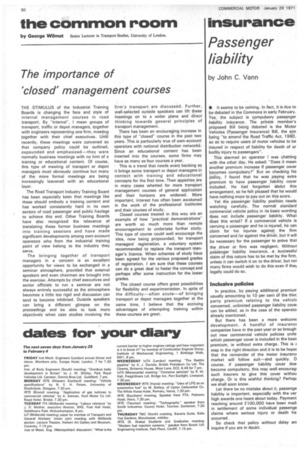The importance of 'closed' management courses
Page 52

If you've noticed an error in this article please click here to report it so we can fix it.
THE STIMULUS of the Industrial Training Boards is changing the face and style of internal management courses in road transport. By "internal", I mean groups of transport, traffic or depot managers, together with engineers representing one firm, meeting together with their chief executives. Until recently, these meetings were convened so that company policy could be outlined, expounded and emphasized—they were normally business meetings with no hint of a training or educational content. Of course, this type of meeting of transport or depot managers must obviously continue but many of the more formal meetings are being increasingly leavened with an educational layer.
The Road Transport Industry Training Board has been especially keen that meetings like these should embody a training content and has worked consistently hard in its own sectors of road passenger and public haulage to achieve this end. Other Training Boards have also recognized the relevance of translating these former business meetings into training sessions and have made significant developments among own-account operators who from the industrial training point of view belong to the industry they serve.
The bringing together of transport managers in a concern is an excellent opportunity for views to be exchanged in a seminar atmosphere, provided that external speakers and even chairmen are brought into the exercise. Attempts by chief executives and senior officials to run a seminar are not always entirely successful as the atmosphere becomes a little too rigid and discussion can tend to become inhibited. Outside speakers can bring a different glimpse on the proceedings and be able to look more objectively when case studies involving the firm's transport are discussed. Further, well-selected outside speakers can lift these meetings on to a wider plane and direct thinking towards general principles of transport management.
There has been an encouraging increase in this type of "closed" course in the past two years. This is particularly true of own-account operators with national distribution networks. Since an educational content has been inserted into the courses, some firms may have as many as four courses a year.
This is a trend that needs every backing as it brings some transport or depot managers in contact with training and educational concepts for the first time. Their appetites are in many cases whetted for more transport management courses of general application and their horizons are widened. More important, interest has often been awakened in the work of the professional institutes and their courses of study.
Closed courses treated in this way are an example of how "practical demonstrations" are worth so much more than remote encouragement to undertake further study. This type of course could well encourage the idea, now being propounded, for transport managers' registration, a voluntary system recommended to replace the transport manager's licence. When schemes of study have been agreed for the various proposed grades of registration. I am sure that these courses can do a great deal to foster the concept and perhaps offer some instruction for the lower grades.
The closed course offers great possibilities for flexibility and experimentation. In spite of the difficulty--often acute—of bringing transport or depot managers together at the same time, I believe that the accruing advantages of attempting training within these courses are great.




























































































